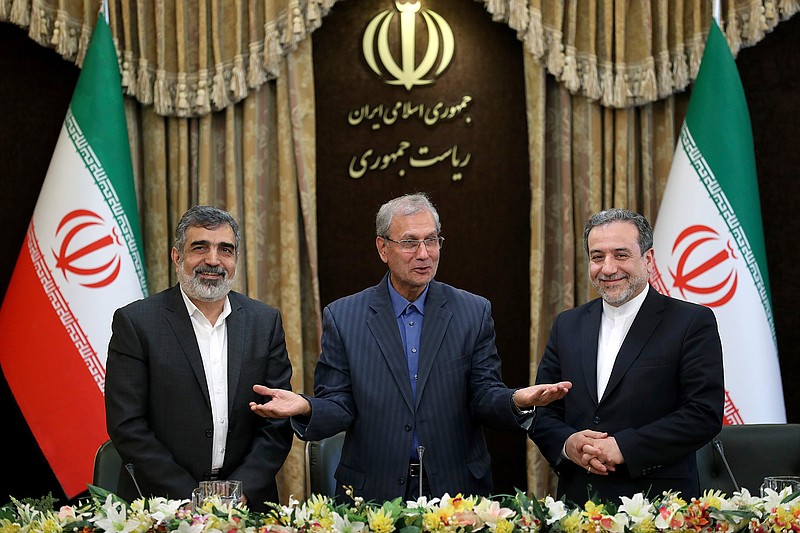TEHRAN, Iran -Iran increased its uranium enrichment Sunday beyond the limit allowed by its 2015 nuclear deal with world powers, inching its program closer toward weapons-grade levels while calling for a diplomatic solution to a crisis heightening tensions with the U.S.
Iran's move, coupled with earlier abandoning the deal's limit on its low-enriched uranium stockpile, intensifies pressure on Europe to find any effective way around U.S. sanctions that block Tehran's oil sales abroad.
But the future of the accord that President Donald Trump unilaterally pulled the U.S. from a year ago remains in question. While Iran's recent measures could be easily reversed, Europe has struggled to respond, even after getting a 60-day warning that the increase was coming.
Meanwhile, experts fear a miscalculation in the crisis could explode into open conflict, as Trump already has nearly bombed Iran over Tehran shooting down a U.S. military surveillance drone.
International reaction to Iran's decision came swiftly, with Britain warning Iran to "immediately stop and reverse all activities" violating the deal, Germany saying it is "extremely concerned," and Israeli Prime Minister Benjamin Netanyahu, a longtime critic of the accord, urging world powers to impose so-called "snapback sanctions" on Tehran.
The European Union said parties to the deal are discussing a possible emergency meeting after Iran's announcement, with EU spokeswoman Maja Kocijancic saying the bloc is "extremely concerned" about the move.
U.S. Secretary of State Mike Pompeo tweeted: "Iran's latest expansion of its nuclear program will lead to further isolation and sanctions. Nations should restore the longstanding standard of no enrichment for Iran's nuclear program. Iran's regime, armed with nuclear weapons, would pose an even greater danger to the world."
At a news conference, Iranian officials said the new level of uranium enrichment would be reached later in the day, but did not provide the percentage they planned to hit. Under the nuclear deal, the cap for enrichment was set at 3.67%, a percentage closely monitored by inspectors from the International Atomic Energy Agency, the U.N.'s nuclear watchdog.
"Within hours, the technical tasks will be done and enrichment above 3.67% will begin," Iran nuclear agency spokesman Behrouz Kamalvandi said. "We predict that the IAEA measurements early tomorrow morning will show that we have gone beyond 3.67%."
The IAEA said it was aware of Iran's comments and "inspectors in Iran will report to our headquarters as soon as they verify the announced development."
Ali Akbar Velayati, an aide to Supreme Leader Ayatollah Ali Khamenei, made remarks in a video Saturday about Iran's need for 5% enrichment. Bushehr, Iran's only nuclear power plant, is now running on imported fuel from Russia that's enriched to around 5%.
Iranian Foreign Minister Mohammad Javad Zarif sent a letter to EU foreign policy chief Federica Mogherini outlining the steps it had taken, said Abbas Araghchi, a deputy foreign minister. Discussions with European powers are continuing and ministerial-level talks are planned later this month, he said.
"We will give another 60-day period, and then we will resume the reduction of our commitments," Araghchi said, without elaborating.
Kamalvandi stressed that Iran will continue to use only slower, first-generation IR-1 centrifuges to increase enrichment, as well as keep the number of centrifuges in use under the 5,060-limit set by the nuclear deal. Iran has the technical ability to build and operate advanced centrifuges that work faster but is barred from doing so under the deal.

